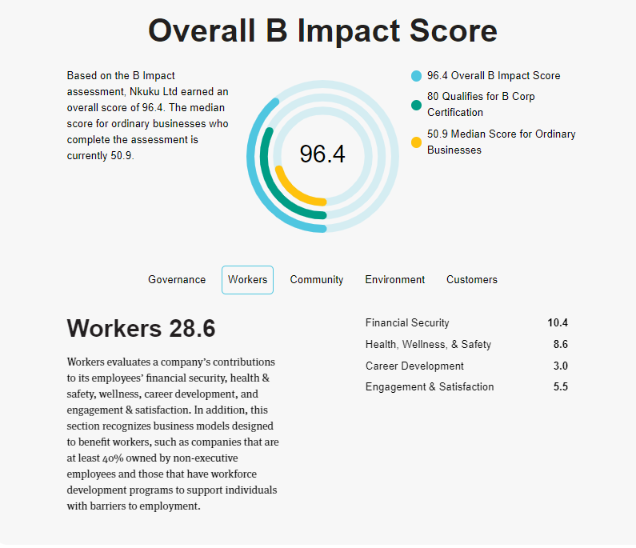What is Bcorp Certification?
B Corp Certification is a designation awarded to companies that meet rigorous standards of social and environmental performance, public transparency, and legal accountability. The certification is issued by B Lab, a non-profit organization that aims to promote the growth of socially responsible and environmentally sustainable businesses.
To become a Certified B Corporation, a company must:
-
Complete the B Impact Assessment (BIA): The BIA is a comprehensive assessment that evaluates a company’s overall impact on its stakeholders, including workers, customers, community, and the environment. The company must achieve a minimum verified score of 80 out of 200 points to qualify for certification.
-
Meet legal requirements: The company must amend its governing documents to legally commit to considering the interests of all stakeholders, not just shareholders. This helps ensure that the company remains mission-driven even as it grows or changes ownership.
-
Sign the B Corp Declaration of Interdependence and Term Sheet: The declaration acknowledges that the company is part of a global movement of businesses working to create positive change. The term sheet outlines the certification requirements and fees.
-
Pay an annual certification fee: The fee is based on a sliding scale, depending on the company’s annual revenue. This supports the ongoing work of B Lab and the development of resources and tools for the B Corp community.
Once certified, B Corps are required to update their B Impact Assessment every three years and maintain the required score to retain their certification. The B Corp Certification allows companies to differentiate themselves in the marketplace, attract impact-driven talent and investors, and join a global network of like-minded businesses committed to using business as a force for good.

B Lab was founded in 2006 in the United States by three friends who shared a vision to make business a force for good. The first 82 Certified B Corps were certified in 2007.
As of March 2023, the global B Corp community has grown to over 6,200 certified companies, with more than 1,600 organizations proudly representing the UK. In February 2023 alone, an impressive 54 UK companies achieved accreditation. These organizations are rigorously assessed across five key categories, demonstrating their commitment to a more sustainable and responsible future.
- Governance: Mission & Engagement
- Workers: Financial Security, Health, Wellness & Safety, Career Development, Engagement & Satisfaction
- Community: Diversity, Equity & Inclusion, Economic Impact, Civic Engagement & Giving, Supply Chain Management
- Environment: Environmental Management, Air & Climate, Water, Land & Life
- Customers: Customer Stewardship

Souce: https://www.bcorporation.net/en-us/find-a-b-corp/company/nkuku-ltd
What is the cost of B Corp Certification?
The cost of obtaining B Corp Certification varies based on a company’s annual revenue, as the certification fees are structured on a sliding scale. There is also a submission fee. In the case of small companies its €250.00. The fees support the ongoing work of B Lab, the non-profit organization that issues the certification, and the development of resources and tools for the B Corp community. Here’s a general breakdown of the annual certification fees:
- Less than $150,000 in revenue: $1,000$
- 150,000 to $2 million in revenue: $1,000 to $4,000
- $2 million to $5 million in revenue: $4,000 to $7,000
- $5 million to $10 million in revenue: $7,000 to $12,000
- $10 million to $20 million in revenue: $12,000 to $20,000
- $20 million to $50 million in revenue: $20,000 to $30,000
- $50 million to $100 million in revenue: $30,000 to $50,000
- $100 million to $250 million in revenue: $50,000 to $60,000
- $250 million to $500 million in revenue: $60,000 to $80,000
- $500 million to $750 million in revenue: $80,000 to $100,000
- $750 million to $1 billion in revenue: $100,000
Please note that these figures are approximate and subject to change. For the most up-to-date fee information, it’s best to consult the B Lab website or contact them directly. It takes between 6 to 8 months for Small to medium sized companies to get evaluated. For larger organisations it will take longer.
Exploring the Workers Section of the B Impact Assessment
The B Impact Assessment (BIA) for the Workers section evaluates a company’s practices and policies related to its employees. The questions in this section are designed to measure the company’s commitment to providing a supportive, inclusive, and empowering work environment. While the specific questions may vary depending on the size and industry of the company, they generally cover the following topics:
-
Compensation and benefits: Questions may address fair wages, bonus structures, employee ownership opportunities, and benefits packages, including health insurance, retirement plans, and paid time off policies.
-
Employee training and development: This includes inquiries about onboarding processes, ongoing training and development opportunities, performance evaluations, and support for career growth.
-
Diversity, equity, and inclusion: Questions may assess the company’s commitment to promoting a diverse workforce, equal opportunities, and inclusive policies for hiring, promotions, and decision-making.
-
Worker health, safety, and well-being: This involves evaluating the company’s policies and practices related to occupational safety, mental health support, work-life balance, and overall employee well-being.
-
Labor rights and fair labor practices: Questions may cover compliance with labor laws, policies on forced labor and child labor, and the company’s approach to ensuring fair treatment for workers throughout its supply chain.
-
Employee engagement and satisfaction: This includes inquiries about employee feedback mechanisms, workplace culture, and efforts to promote engagement and job satisfaction.
-
Flexibility and work-life balance: Questions may assess policies around flexible work arrangements, parental leave, and other measures to support employees in managing their personal and professional lives.
Keep in mind that the B Impact Assessment is tailored to each company’s unique context, so the specific questions may vary. To get a better understanding of the assessment, you can explore the BIA online or create a free account on the B Impact Assessment website.
Essential HR Policies for Aspiring B Corps: Building a Strong Foundation for Certification
When applying for B Corp certification, it’s important for a company to have strong HR policies in place that demonstrate its commitment to social responsibility and employee well-being. While the specific policies may vary depending on the size, industry, and location of the company, some key HR policies to consider include:
-
Fair compensation and benefits: Establish clear and transparent policies on fair wages, benefits packages, and employee ownership opportunities, ensuring they are competitive and equitable.
-
Diversity, equity, and inclusion: Develop policies that promote diversity in recruitment, hiring, and promotions, and foster a culture of inclusivity and equal opportunity within the workplace.
-
Training and professional development: Implement policies that support employee onboarding, ongoing training, skill development, and career advancement opportunities.
-
Employee health, safety, and well-being: Establish policies to ensure a safe and healthy work environment, including adherence to occupational health and safety standards, mental health support, and work-life balance initiatives.
-
Labor rights and fair labor practices: Develop policies that uphold labor rights, comply with relevant labor laws, and ensure ethical treatment of workers throughout the supply chain.
-
Employee engagement and satisfaction: Implement policies that promote open communication, feedback, and engagement, fostering a positive workplace culture and high levels of job satisfaction.
-
Flexible work arrangements and parental leave: Develop policies that support employees in achieving a healthy work-life balance, including flexible work schedules, remote work options, and comprehensive parental leave policies.
-
Performance management and evaluation: Establish clear policies on performance appraisals, goal-setting, and feedback mechanisms to help employees understand expectations and opportunities for growth.
-
Grievance and conflict resolution: Implement policies to address and resolve employee grievances, conflicts, and disciplinary issues in a fair, consistent, and timely manner.
-
Sustainability and environmental responsibility: Encourage and support employee participation in sustainability initiatives and adopt environmentally responsible practices within the workplace.
Having these HR policies in place not only supports a successful B Corp application but also contributes to a healthier, more engaged, and more productive workforce.
Verification and Transparency: How B Corp Certification Requires Proof of Policies
During the B Corp certification process, companies are required to provide evidence to support their responses to the B Impact Assessment (BIA) questions. This evidence may include policy documents, internal reports, or other relevant materials that demonstrate the company’s commitment to social and environmental responsibility. B Lab, the organization responsible for the certification, may request copies of policies or other documentation during the assessment and verification process.
The verification process is designed to ensure the accuracy and integrity of the information provided in the BIA. B Lab may ask for additional clarification or documentation based on the company’s responses. This helps maintain the credibility of the B Corp certification and ensures that certified companies truly meet the high standards of social and environmental performance, accountability, and transparency required for the designation.
